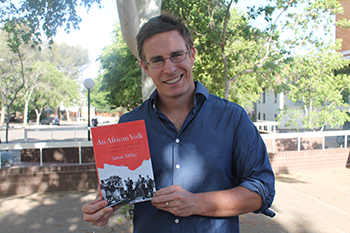Latest News Archive
Please select Category, Year, and then Month to display items
02 November 2023
|
Story Kekeletso Makau
|
Photo SUPPLIED
 The UFS Heads of Mission Breakfast event attracted a distinguished delegation of foreign diplomatic missions.
The UFS Heads of Mission Breakfast event attracted a distinguished delegation of foreign diplomatic missions.
The second Heads of Diplomatic Mission breakfast was hosted by the University of the Free State (UFS) in collaboration with the Mapungubwe Institute for Strategic Reflection (MISTRA) in Pretoria, South Africa on 26 October 2023.
The event served as an opportunity to position the UFS as a preferred partner for international collaboration in higher education, research, and innovation – following the success of the inaugural event in 2022. More than ten diplomatic missions were represented by distinguished foreign mission representatives who shared in the deliberations on this year’s theme, namely partnerships and collaborations.
The keynote address was delivered by the UFS Vice-Chancellor and Principal, Prof Francis Petersen, with contributing presentations from MISTRA researcher Laurence Caromba, UFS Professor of Pharmacology, Prof Motlalepula Matsabisa, and Senior Lecturer from the Centre for Gender and Africa Studies, Dr Grey Magaiza. A key goal of Prof Petersen’s presentation was to highlight the benefits of reciprocal collaboration and co-creation of knowledge with international partners, including industry partners. Contributing presentations posited the UFS as a partner of interest in research, innovation, and technology in the international arena and showcased the value of university and diplomatic partnerships in support of the UFS Internationalisation Strategy and Vision 130.
Caromba, a MISTRA researcher, reiterated the importance of collaboration between universities, research institutes, and the diplomatic community, further reaffirming the partnership value proposition entrenched in the UFS-MISTRA collaboration in co-hosting this year’s event. MISTRA, a renowned influential think tank, served as an excellent partner for the event.
The UFS currently boasts more than 100 vibrant international partnerships and is the incumbent coordinator of large EU-funded Erasmus+ projects among South African universities, with UFS researchers having co-authored more than 5 000 scientific publications with universities worldwide (2018-2022).
An engaging question-and-answer session concluded with insights and further action items for continued engagement post the event.
US author launches book at UFS on African volk
2016-10-17

Dr Jamie Miller, Postdoctoral Fellow at the
University of Pittsburgh and author of
An African Volk: The Apartheid Regime
and Its Search for Survival.
Photo: Rulanzen Martin
“I realised the importance of not just accessing the policies and political approaches of the leaders of the apartheid regime, but understanding the ideas and world views that informed them. Part of the solution to this was to learn Afrikaans.”
This is according to Dr Jamie Miller, a Postdoctoral Fellow at the University of Pittsburgh, on how he went about getting inside the mind of South Africa’s apartheid regime in order to complete his book, An African Volk: The Apartheid Regime and Its Search for Survival.
The book was launched on 11 October 2016 by the Archive for Contemporary Affairs at the University of the Free State on the Bloemfontein Campus.
Volk refers to the Afrikaner nationalist movement
The book is an ambitious new international history of 1970s apartheid South Africa. It is based on newly declassified documents and oral histories, the majority in Afrikaans, which focus on the regime’s attempts to turn the new political climate to its advantage.
The term volk refers to the Afrikaner nationalist movement, also known as Afrikanerdom. The story of Afrikaner nationalism was the medium through which the regime gained power.
Four main messages from the book
Dr Miller says there are four main messages for his readers. Firstly, the apartheid regime looked to contest and hijack new ideas and norms that formed the postcolonial world, and secondly, that we need to start thinking more seriously about the Cold War in terms of domestic politics, not just geopolitics.
Thirdly, South Africa should be integrated into histories of the global South, and lastly, we should conceptualise the apartheid regime by looking at it not just as an imperial holdover, but also by looking at what was happening in the world in the time period in question.